Статьи журнала - Arctic and North
Все статьи: 972
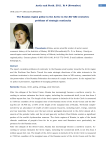
The Russian region policy in the Arctic in the XX−ХХI centuries: problems of strategic continuity
Статья научная
The report considers problems of continuity in the Russian state’s policy towards the Arctic region and the Northern Sea Route. Traced the main strategic directions of the state interests in the northern territories in the twentieth century and expansion them to XXI century, associated with the preservation of the Russian Federation the status of a major Arctic power. In the regional Arctic policy is permanent, regardless of changing political regimes.
Бесплатно
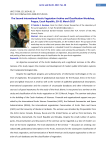
Статья научная
Here we present a brief overview of events and presentations at the International Arctic Vegetation Archive and Classification Workshop, held in Prague, the capital of the Czech Republic, on 30–31 March 2017. The purpose of the workshop was to collect and process data about the Arctic vegetation. The data supposed to be presented in a standard format for subsequent classification and analysis. Twenty-nine scientists from most of the Arctic states were among the participants of the workshop. They presented an overview of existing databases on vegetation, discussed the possibility of sharing and pooling of data as well as possible ways of classification for the pan-Arctic vegetation.
Бесплатно
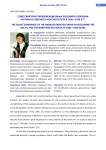
Статья научная
The problems of the mobilization decisions in the economic and military-strategic development of the Arctic and the Northern Sea Route in 1930-1950-ies. Analyzes the Soviet experience in the implementing important for the state of the socio-economic programs in the northern areas rich in the natural resources.
Бесплатно
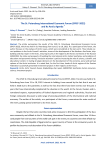
The St. Petersburg International Economic Forum (SPIEF-2022) and Its Arctic Agenda
Статья научная
The article summarizes the results of the 25th St. Petersburg International Economic Forum (SPIEF-2022), which was held in St. Petersburg from June 15 to 18, 2022. As a participant of the forum, the author focuses on the analysis of Arctic issues, which were considered at the last event. They include current problems in the Arctic Council's activities, issues of the development of the Northern Sea Route, shipbuilding and ship repair in the Arctic, ensuring security in the region by the forces and means of the Russian EMERCOM, the state and prospects of building the international Arctic station Snezhinka, and problems of education and personnel training. Particular attention is paid to increasing the role of science, scientific and educational centers in making strategic decisions on the development of the economy, social and spiritual spheres of the Arctic territories. It is noted that, for the first time, heads of Arctic regions of the Russian Federation successfully presented investment projects in their regions at the Forum.
Бесплатно
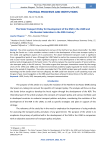
Статья научная
The article examines the development and use of the Northern Sea Route (hereinafter: the NSR) during the Soviet era. It also considers various trends in the development of the state transport policy in the world and significant aspects of its assessment. The above-mentioned transport route is significant from a geopolitical point of view. Although the USSR failed to realize the commercial potential of the NSR and its year-round operation, it made significant progress in the development of the NSR to achieve the political and strategic goals of the Soviet Union. The article analyzes the essential aspects of Soviet and Russian transport policy in the XX century. The author argues that transport innovations caused by the energy crises of the 1970s and 1980s and related environmental problems largely bypassed the Soviet economy due to the period of stagnation. The author concludes that if the USSR had kept pace with modern trends in technology and the Soviet Union had not collapsed, the NSR could have become a self-sustaining route and the goal of year-round navigation on the NSR would have been achieved in Soviet times in the 20th century.
Бесплатно
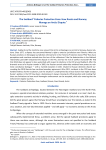
The Svalbard fisheries protection zone: how Russia and Norway manage an Arctic dispute
Статья научная
Svalbard and the maritime zone around this Arctic archipelago are central to Norway-Russia relations. Since 1977, a dispute has concerned Norway's right to exercise jurisdiction over fisheries. What are Russian positions on Norwegian jurisdiction enforcement in the Fisheries Protection Zone (FPZ)? How have perceptions and reactions evolved since the turn of the millennium? Has the deterioration in the bilateral relationship post-2014 sharpened the dispute in the FPZ, and has the risk of conflict increased? We find that 2014 does not appear to be a watershed with respect to relations in the FPZ around Svalbard. After the dramatic arrest of a Russian trawler in 2005, the Russian central authorities switched from protest to relatively conciliatory dialogue - with a marked exception in 2011 related to Russian domestic discord surrounding the 2010 Barents Sea maritime boundary agreement. After 2011, incidents in the FPZ have been handled without further escalation, but the situation is underpinned by various factors that might change. Russia’s policies in the FPZ have been a balancing act: always stressing its official position and insisting that there are limitations to how much Norwegian enforcement can be accepted, while also ensuring that the enforcement regime survives.
Бесплатно
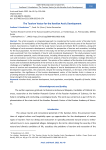
The Tourism Vector for the Karelian Arctic Development
Статья научная
The article presents an integrated approach to considering the tourism vector of Karelian Arctic development. Six municipalities of the Republic of Karelia, included into the Arctic zone of the Russian Federation, have become a model site for the study. Severe natural and climatic North conditions, along with challenges of socio-economic development, actualize the perspective of tourism and recreation, including for the local population. For the first time in the study, the territory of the Karelian Arctic was comprehensively examined from the standpoint of tourist and recreational development. The study analyzes tourist and recreational potential, tourist infrastructure, including infrastructure of accommodation, catering, leisure and recreation, tourist flow and types of tourism; projects of tourist orientation, strategic directions of tourism development in the municipal context. The opinion of the residents of the Karelian Arctic about the tourist and recreational development of the territory is also taken into account, and limitations and current challenges are highlighted. The study reveals the diversity of municipal districts in the Karelian Arctic in terms of tourism and recreational potential, the degree of tourist development of the territory, tourism development opportunities, the constraints. Despite the existing limitations, on the basis of the identified opportunities, the significance of the tourism development vector of the Karelian Arctic is shown as a promising direction of domestic tourism in the Russian North, as well as a tool to restore physical and emotional strength of the local population.
Бесплатно
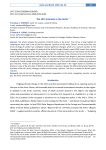
The UK’s interests in the Arctic
Статья научная
The article analyzes the priorities of British policy in the Arctic. The UK has a long tradition of studying the Arctic and is one of the first observer countries of the Arctic Council. At the same time, the Arctic strategy of London has undergone several significant changes, which are a natural reaction to the changing situation in the region. An analysis of the British Foreign Ministry report 2018 reveals four primary areas of the UK's interest in the Arctic. First, the country's economy continues to rely heavily on the hydrocarbon and bioresources of the Arctic. Secondly, after the outbreak of the Ukrainian crisis and in the conditions of deteriorating relations with Moscow, the British authorities have begun to pay more attention to the security, primarily the military one. Third, an important direction of the UK Arctic policy is to solve the problem of climate change since the country considered one of the world leaders in reducing greenhouse gas emissions. Finally, the development of international cooperation in the region based on scientific diplomacy is one of the priorities of British Arctic politics. However, despite the official documents fixing the priorities of the UK’s Arctic strategy, London’s Arctic policy is passive. This fact is a reason for British expert criticism.
Бесплатно
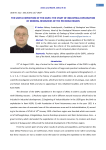
Статья научная
The reasons of sending special expedition of the OGPU in 1929 to the Ukhtariver are analyzed. The main factor of sending the expedition was the reform of the penitentiary system of the USSR and transition to use of compulsory labor of prisoners.
Бесплатно
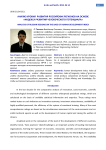
Статья научная
A description of the human development index (HDI) in relation to the Russian Arctic. A comparison of regional HDI using data mining techniques.
Бесплатно
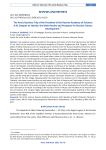
Статья научная
The analytical review is devoted to the progress and results of the three-day business trip (March 17–19, 2021) of the President of the Russian Academy of Sciences, Academician A.M. Sergeev, to the Republic of Sakha (Yakutia) as part of a large group of scientists from the Russian Academy of Sciences and its Siberian branch. During this period, he visited more than 20 scientific and educational objects in Yakutsk and Tiksi village, met with their leaders, got acquainted with the main directions of their activities. The article reveals and analyzes numerous meetings of the President of the Russian Academy of Sciences with scientists, his speeches at conferences and round tables, where his key positions and assessments regarding the role of science in the development of Russia and Yakutia are outlined in the light of the requirements of the decree of the President of the Russian Federation “On measures to improve the efficiency of state scientific research and technical policy”. Special attention is paid to the results of meetings with the leadership of the Republic of Sakha (Yakutia), the Academy of Sciences of the republic, visits to the Federal Research Center “Yakutsk Scientific Center of the Siberian Branch of the Russian Academy of Sciences" and its institutions, North-Eastern Federal University named after M.K. Ammosov, scientific and educational laboratory "Agrokub", the Polar Geocosmophysical Observatory, the station of rocket sounding of the atmosphere and the wind-diesel complex. The article contains innovative material on a comprehensive development plan for the Tiksi village. Speaking about the importance of a business visit to the Republic of Sakha (Yakutia), the author notes that this trip took place in the Year of Science and Technology in Russia, on the eve of the Russian Federation's chairmanship in the Arctic Council, and thus emphasized the importance of the region in the Arctic state policy and gave a good impetus for further development of scientific organizations and science in Yakutia. According to the results of work in Yakutia, the President of the Russian Academy of Sciences A.M. Sergeev highly appreciated the scientific and technological potential of the region, noted the most promising areas of fundamental and applied research that can ensure breakthrough development of the region.
Бесплатно
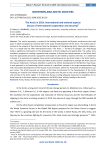
Статья научная
The article represents a review of the leading international and Russian conferences that took place in 2019 and played an essential role in the study and development of the Arctic. The author paid attention to the analysis of their features from the standpoint of strengthening Arctic international cooperation. It is noted that the Fifth International Forum “The Arctic - Territory of Dialogue” (St. Petersburg) made a significant contribution to the development of Arctic solidarity and partnership. The author commended a proposal of creating a separate state company in Russia that would operate on the Arctic shelf, have the appropriate personnel, equipment and would not be related to business interests. It is noted that in Russia, it is necessary to organize more events and conferences on the Arctic topic in the Arctic territories. The publication concerns the measures taken by the country's leadership to manage the Arctic zone of the Russian Federation. Particular attention is paid to the further development of the Northern Sea Route, a new approach to its functioning, which consists of a significant increase in its cargo transportation along with the parallel development of the Russian Arctic territories within the framework of development support zones. The article presents an analysis of the State Commission for the Development of the Arctic meetings on research and national projects. The author also focuses on the current problems of defense and security in the Arctic region. It is noted that Russia is taking adequate measures to strengthen its national security in the Arctic region in response to the NATO states' military buildup in the Arctic.
Бесплатно
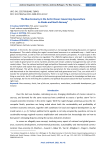
The blue economy in the Arctic Ocean: governing aquaculture in Alaska and North Norway
Статья научная
In the Arctic, the concept of the blue economy is increasingly dominating discussions on regional development. This entails utilising the region’s ocean-based resources in a sustainable way - both from a global and local level, as well as from an environmental and economic perspective. A crucial aspect in this development is how blue activities are regulated. The UNCLOS-regime plays a vital part in providing the mechanisms and procedures for states to manage marine resources more broadly. However, the predominant mode of governance for Arctic maritime activities will remain unilateral management by each of the coastal states. Thus, the national and local legal and political framework needs to be mapped. In this article we will explore and explain how aqua/-mariculture is governed in the United States (Alaska) and Norway (North Norway). This will be done by examining how parameters for blue economic projects are defined and determined at the international, regional, national and local governance level. Thus, our article will illustrate the complexity behind the blue economy. There is no such thing as one blue economy and no such thing as one Arctic, but it is still possible to find common ground and avenues for knowledge and best practice exchange. By this we will bring the academic and political discussions about the blue economy on the right track.
Бесплатно
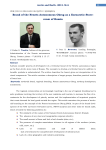
The brand of the Nenets Autonomous Okrug as a Euroarctic Storeroom of Russia
Статья научная
Authors consider process of development of a territorial brand of the Nenets autonomous region as the Euro-Arctic store room of Russia. The necessity to develop a territorial brand in addition to heraldic symbols is substantiated. The author describes the brand, gives an interpretation of its visual components. The article contains a description of target groups, describes practical results of brand use.
Бесплатно
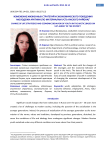
Статья научная
The article deals with the changes of life strategies and the economic behavior of youth in the Arctic. The data of the survey, we got in one of the аrctic regions of Yakutia. The ways of social adaptation of youth in conditions of changing the economic development of the region analyzed.
Бесплатно
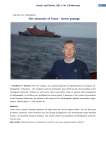
The chronicle of transarctic passage
Статья научная
Notes of sea captain Vladimir Sokolova we begin from the «Arctic regions today». For the first time in history existence of the Northern sea way during navigation by one icebreaking vessel «Michael Somov» are provided all polar stations. The author reflects on problems of development of Northern sea way.
Бесплатно
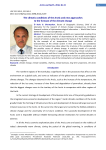
The climatic conditions of the Arctic and new approaches to the forecast of the climate change
Статья научная
The properties of climate variability are represented resulting from the special statistical analysis of observations of the world meteorological network of stations, taking into account the features of the northern regions. By the example of air temperature free and forced oscillation of characteristics of the climate system in their interaction are considered. There are formulated new ideas about the structure of the oscillations and the possible causes of climate change. A statistical model of a periodic nonstationarity of climate is suggested for forecasting climate variations for next two decades and there is suggested a model for monthly and seasonal weather forecasts for the next year. The practical importance of predictive research is particularly high in the harsh climate of the north, where the climate is one of the limiting factors of industrial development of the northern regions.
Бесплатно
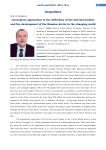
Статья научная
The trends of the modern geopolitical situation in the Arctic and the problems of the development of the Russian Arctic zone.
Бесплатно
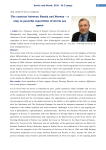
The contract between Russia and Norway − a step to peaceful repartition of Arctic sea space
Статья научная
This article deals with the Contract between the Russian Federation and the Kingdom of Norway about differentiation of sea areas and cooperation in the Barents Sea and Arctic Ocean. After adoption of United Nations Convention on the Law of the Sea (UNCLOS) in 1982, the Ilulissat Declaration of 2008 contract ratification between Russia and Norway in 2011 becomes the most important step to peace repartition of Arctic sea space. At the continuing global war for resources of Arctic regions momentous event has occurred, which will undoubtedly become a model and example for the Arctic countries. The shorthand report of session of the State Duma are published, the various points of view on an investigated subject are reflected and investigated. In the annex to the article the official text of the contract and other materials.
Бесплатно
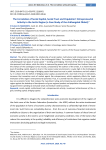
Статья научная
The article considers the relationship of social capital, institutional and interpersonal trust, and entrepreneurial activity on the data of the Arkhangelsk Oblast. The authors, following R. Putnam, analytically distinguish two types of social capital - bonding and bridging. The level of the former is measured by interpersonal trust indices, while the latter is measured by general and institutional trust indices. Based on the analysis of the sociological survey results, conducted by the authors of the article, it is shown that the level of bonding capital, based on trust in the nearest social environment, is quite high in the Arkhangelsk Oblast, but there is a shortage of bridging capital that based on trust in public institutions and civil solidarity. It is shown that the deficit of bridging social capital, associated with a low level of trust in institutions, increases the transaction costs of market agents like entrepreneurs, which negatively affects the implementation of the region's entrepreneurial potential. Thus, it is proved that the amount of social capital is a key non-economic factor that reduces the investment rating and entrepreneurial activity indicators in the region against the backdrop of low dynamics of gross regional product and population incomes and increasing government spending to stimulate small and medium-sized businesses.
Бесплатно

